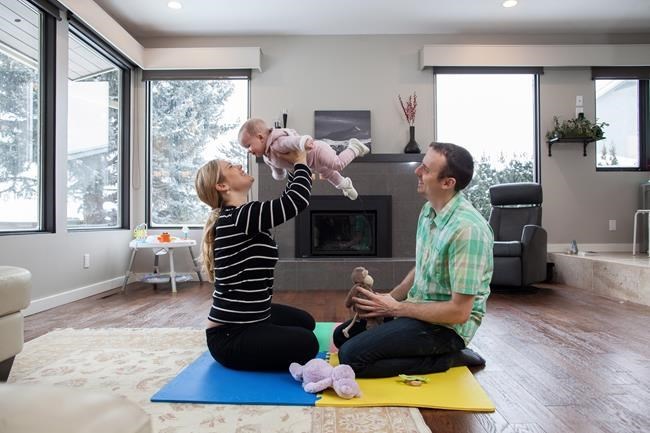
Sarah Simon, husband Julien and their five-month-old daughter Chloe enjoy some family time in their living room at their Kamloops, B.C. home on Monday, Feb. 6, 2017. The family has recently relocated to Kamloops from Vancouver for more affordable housing. THE CANADIAN PRESS/Jeff Bassett
February 08, 2017 - 4:32 AM
TORONTO - Julien Simon and his wife were living happily in their condo in the Vancouver suburb of Burnaby when life intervened last year in the form of a baby on the way.
The couple — he's an Internet marketer, she's an environmental engineer — couldn't see themselves living in a shoebox crammed full of baby stuff, so they pulled up stakes, put their condo up for sale and moved about four hours away to Kamloops, B.C., where they bought a four-bedroom house for nearly the same price.
"In Vancouver, this house would be in the $2 million range," says Simon, who works from home while his wife now works for the government as a flood safety engineer.
While more detailed profiles will emerge in subsequent releases, the 2016 census data released Wednesday found that there were more than 14 million occupied private dwellings in Canada, a 5.6 per cent increase over the five-year period that ended in 2011. That growth rate, however, was significantly lower than the 7.1 per cent rate recorded five years ago.
Thanks in large part to a commensurate spike in population that was the largest in Canada, Nunavut reported the fastest dwellings growth at 13.4 per cent, followed by Alberta (9.9 per cent), Yukon (7.8 per cent) and British Columbia (6.6 per cent).
With housing prices spiking in major urban centres like Toronto and Vancouver, much of that growth has been in smaller communities as more and more young families choose to move further away to realize their dreams of owning a home.
"People want a back yard, a driveway and a stand-alone home so they can have the space for their families," said Christopher Alexander, regional director at ReMax Ontario-Atlantic Canada.
"If you're commuting to the city and you're fighting traffic, that can be a challenge, but I think many people find the sacrifice worth it so they can find housing that suits their lifestyle needs."
Last month, Canada's federal housing agency found high house prices in the Toronto area have been spilling over into nearby cities like Hamilton, Barrie and Guelph, and even to farther-flung areas such as the St. Catharines-Niagara region.
That, in turn, has resulted in higher prices in those centres, the Canada Mortgage and Housing Corp. concluded.
Hamilton is the market that's most sensitive to house prices in the Greater Toronto Area, according to the report, which estimates that a one-per-cent change in GTA house prices would result in a two-per-cent change in Hamilton prices after three years.
The city's real estate market has been on a tear in recent months, with December sales up 13.1 per cent from a year ago, compared to a median price increase of 18.4 per cent.
Rising property values have transformed formerly derelict streets into well cared-for neighbourhoods, Conrad Zurini of ReMax Escarpment Realty said of the blue-collar industrial city locals affectionately call the Hammer.
"You're seeing this whole metamorphosis of these neighbourhoods changing dramatically over short periods of time."
The city's demographics have also been shifting. Despite the province's aging population, millennials now comprise 28 per cent of the population, outnumbering the baby boomers, according to a 2016 study by the Social Planning and Research Council of Hamilton.
Details about the age and gender of Canada's population will be part of the next major census release, scheduled for May.
"A lot of what attracted me was Hamilton’s arts and culture scene," said Holly Knowlman, a 30-year-old software professional who recently purchased a pre-construction condo in Steeltown and plans to make the move from Toronto once it's finished.
"It's an industrial city with that Detroit-esque kind of vibe. I'm excited."
Knowlman says she loves Toronto, but all of the units she looked at in her price range were bachelors under 500 square feet. Her future home in Hamilton is nearly twice that size with an extra room, a walk-in closet, a balcony and a fireplace.
Such a move often comes with major lifestyle changes including, for some, lengthy commutes. Knowlman said she plans to take the commuter train to work.
"The saddest thing for me is that I can't bike to work anymore, or home from parties or events," said Jackie Levitt, a supply teacher and artist who made the move from Toronto to Hamilton more than two years ago.
"But I've gotten more cash flow in my life, which seems weird as a homeowner, but that's how it’s worked out. I've got more space in my home. Even out in the city there's more space. You're not fighting for a spot at the park or in the bike lanes. You've got room to breathe on the sidewalks."
Cherise Burda, executive director of the city building institute at Ryerson University, said out-migration can spell trouble for cities like Toronto and Vancouver.
"Families need to stay," said Burda — a diverse population that includes young families helps to support services and infrastructure in the city, she argued.
Currently, developers are not building enough "missing middle" housing — townhouses, mid-rise buildings and stacked flats — that can accommodate families better than condominiums.
"The city and the province need to figure out how to make it more cost-effective for developers to build those types of buildings. The reason they don't is because it's so expensive in places where the land value is so high."
— Follow @alexposadzki on Twitter
News from © The Canadian Press, 2017